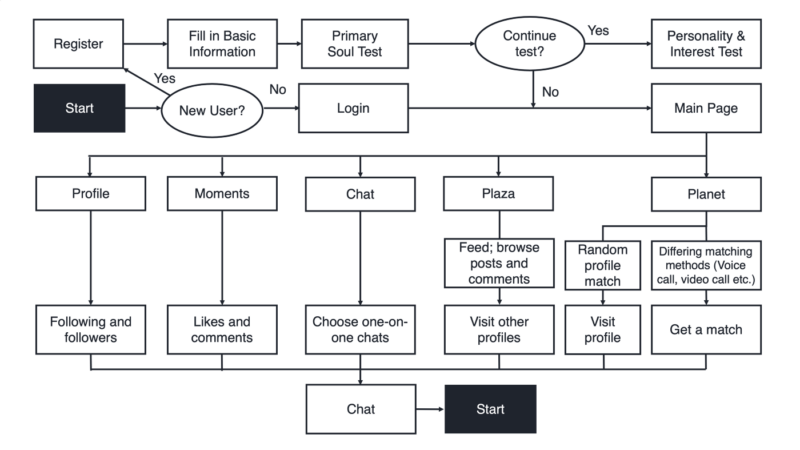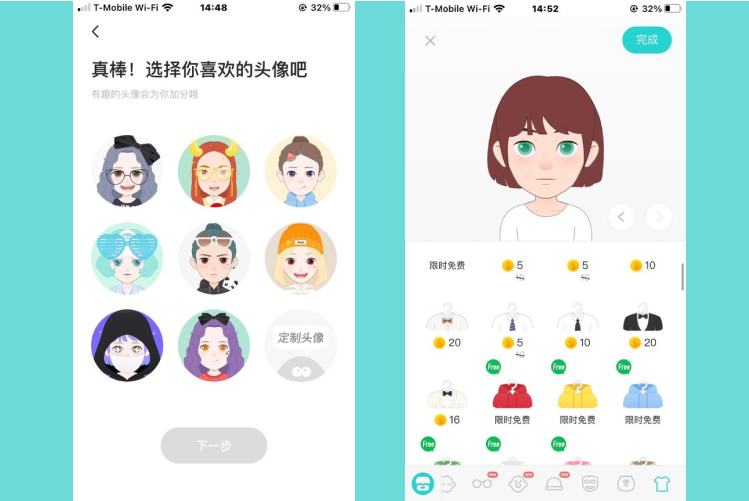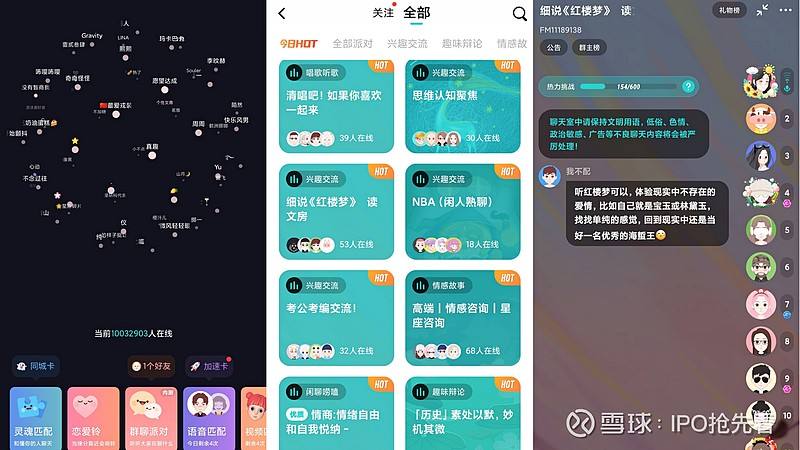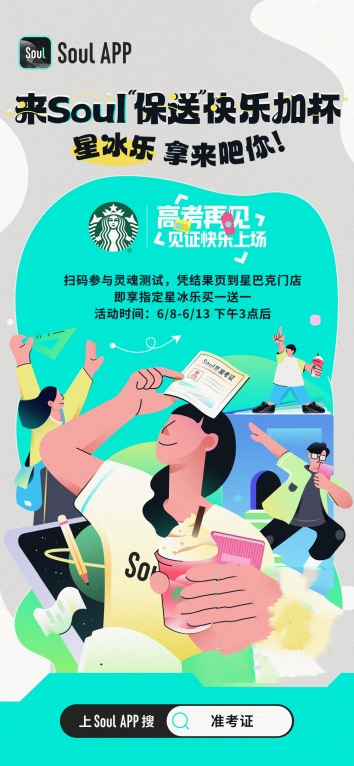Founded in 2016, the Chinese algorithm-driven app Soul created a new-style social media metaverse dating app especially designed for the Generation Z. The app aims to provide users a free, safe, and fun environment to express their feelings and build connections through interest sharing and deep conversations. Unlike other dating apps and social networks, Soul allows users to create an avatar and connect with like-minded users via a personality test, thereby reducing users’ concerns about physical appearance anxiety, harassment, and frauds.
After four rounds of Venture Capital funding, the app finally received a 167 million equity investment from Tencent and the Chinese mobile game developer miHoYo in June 2021. Later in May of the same year, Soul went public on Nasdaq but soon announced to withdraw its F-1 registration statement document. However, in 2022, the company revived the IPO sponsored by Bank of America Merrill Lynch and CIC. Now, Soul is one of the apps with the highest daily traffic volume and penetration rate among Generation Z.
According to the app’s data in March 2021, Soul has 9.1 million DAUs (Daily Active Users) and 33 million MAUs (monthly active users) who spent an average of 40 minutes daily on the app, thus recording a 94.4% increase from the previous year and becoming the app that has the highest number of DAUs among its competitors.
Who are the “Soulers”?
Gen Z account for the largest user group on Soul by age, and account for the majority of the DAUs that is expected to reach 331 million by 2024.
Around 60% of Soul users in China are aged between 18 and 24, and have a lot of free time to spend on dating apps and social media. Regarding gender distribution, male users on Soul took over around 45% of its user base in 2018, whereas female users account for 55% of the total. However, as the app keeps upgrading its functions and marketing strategies, more and more Chinese males have signed up on Soul. In February 2021, the app’s gender ratio gradually reached a balance, and now males account for about 52.4% of its user base.
The growing “Souler” population worldwide
Although most ”Soulers” are concentrated in China, there is a growing population of users outside the country after the launch of the app on the Korean and North American markets in 2020. Currently, the app has over 100 million users worldwide, with male and female Soul users nearly equally distributed, among which 3,500 are from the US. Overall, around 60% of Soul users are located in first and second-tier cities and aged between 18 and 24 years old.
Soul’s main features
As Soul aims to create an interest-based community, the unique function of this app is to allow each user to take a “Soul Mode” quiz after registration that profiles users’ personalities, hobbies, and attitudes toward life. The quiz includes questions like “Do you like spending some time alone when you feel upset” and “How do you usually make yourself happy” to connect users who share similar characteristics. Then, users become “Soulers” on the Soul’s “planet,” from where they can unlock the functions of Soul Cam, Audio Call, direct text chat, and a public feed called “Explore” to interact with others through posts and videos. The advanced AI algorithm provides users with relevant content to enhance their experience.

Users can create true-to-life avatars
In order to avoid harassment and matching other people solely based on physical appearance, no personal information is disclosed. Users can feel free and safe to connect with each other by building their avatars to express themselves and personalizing their look and their outfits. Moreover, Soul Lens can project users’ facial expressions on their animated avatar through Soul Cam without any identity leakage. Users can also upgrade their profiles by purchasing additional premium avatars and accessories.

Unique user experience
Soul allows users to meet new people through the “Meet Me” function with ten matches around the world. Once a “Souler” clicks the button, he or she will see the matching person’s profile page and a percentage showing the level of affinity with them.
In addition, Soul offers free four-minute audio calls between random users without asking them to reveal their identity. Users can extend the call up to ten minutes by paying ten Soul coins or revealing their profiles to each other to continue the conversation without any time restriction. Furthermore, the top-up plans with Soul Coins allow users to unlock other options like additional calling time, filters, or virtual decorations. The cheapest top-up plan is 1 RMB for 6 Soul coins.
Virtual parties, quizzes and games offer users an immersive experience
If you are looking for more vivid interaction, Soul allows users to have video calls with their faces covered with various interesting filter masks as well. “Virtual Party” is another place where users can enjoy connecting with new friends with similar interests. Users can feel free to enter different party rooms, take a seat, turn on the mic to join the voice party, and send gifts.

Another interesting feature of Soul is the “Soul Quiz,” where users can do all kinds of tests, especially related to personality and relationship. Users can find their test result cards under the “Results” button and share them with friends or on social media.
Beyond the typical dating and social media functionalities, Soul also features gamified functions that encourage users to engage and interact, mainly through co-experiencing in various scenarios and extensive media forms like lens filters and animated party rooms.
What makes Soul different from its competitors?
As Tinder and other western dating apps are banned in China, the country has developed its own apps like Momo, Tantan, and Jimu, who are Soul’s main competitors. Momo and Tantan are like Tinder, with swipe matching functions through photos to connect with people nearby and monthly membership plans for advanced functions. In contrast, Jimu is similar to Soul, as it is more focused on lifestyle and interests sharing. Users can “follow” and “like” other users’ posts of events, food, and so on, like on other social media platforms.
On the other hand, unlike these location-based dating apps focusing on all generations, Soul is especially designed for Generation Z who are unwilling to reveal their identity or their location and are looking for an immersive social networking experience, with funny games, quizzes, and coin bonuses offered.
Much more than just a dating app
Soul engages in various activities and events, including a collaboration with local rock singer Wang Feng to release his new album on Soul’s platform and the partnership with local government for fighting against online fraud.
In 2022, Soul collaborated with General Motors’s sub-brand Chevrolet to create a 3D avatar as the 2021 brand ambassador. The vivid 3D brand ambassador based on the Metaverse technology created an incredible user experience through the interactions between the virtual idol and Chevrolet´s customers. Moreover, Soul’s avatars are not just able to do basic movements. but the platform vaunts an advanced technology enabling to capture more detailed human facial expressions and actions, which allows users to have a more true-to-life experience.

In July 2022, along with Starbucks, Soul held the event called “Gaokao time machine” to trigger users’ memories of their “Gaokao”. Users could take a quiz on the app to test what kind of students they are and enjoy a “buy one get one for free” offer at Starbucks with their test result card from Soul. Within a week, about 15 thousand users participated to Soul’s “Gaokao” campaign.

So far, Soul has attracted over one million young users and realized its own ecosystem by upgrading its functions and exploring more commercial opportunities during various social events and brand collaborations.
What we can learn from Chinese dating app “Soul”
- The Chinese algorithm-driven app Soul created a new-style metaverse dating app for Generation Z. It is an avatar-based app that allows users to create virtual identities and connect with other like-minded people after taking a personality test. The app made its first public listing in 2021 but soon withdrew its F-1 registration statement document and for then reviving the IPO one year later.
- Soul is one of the apps with the highest daily traffic volume and penetration rate among Generation Z. It has 9.1 million DAUs and 33 million MAUs who spent an average of 40 minutes daily on the app in 2021. Most users are aged between 18 and 24.
- At the beginning, the app counted more female users, but then the platform was able to attract a growing number of males. Currently, the app has over 100 million users worldwide, with male and female Soul users nearly equally distributed, and over 70% are from the middle and low-income groups.
- As Soul aims to create an interest-based community, users can connect by building their avatar images to express themselves and personalizing the look and the outfits without revealing their identities.
- Users can enjoy functions like direct text chat, Soul Cam, Audio Call, Virtual Party, Soul Quiz, and a public community with top up plans to unlock other options. And Soul Lenses enables users to portray detailed facial expressions with animated avatars.
- Unlike other popular location-based matching apps like Tantan, Momo, and Jimu, Soul is especially designed for Generation Z who do not want to be forced to reveal their identities and want to have a more enjoyable social networking experience.
- The app engages actively in various events and collaborations. So far, it has attracted over 100 million young people and commerce-commerce built its own ecosystem.
Author: Ariel Wu




